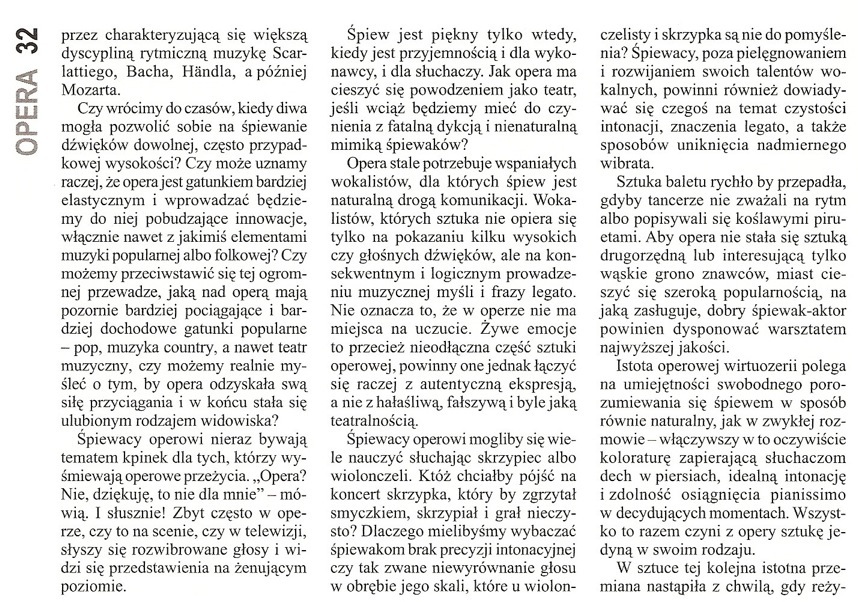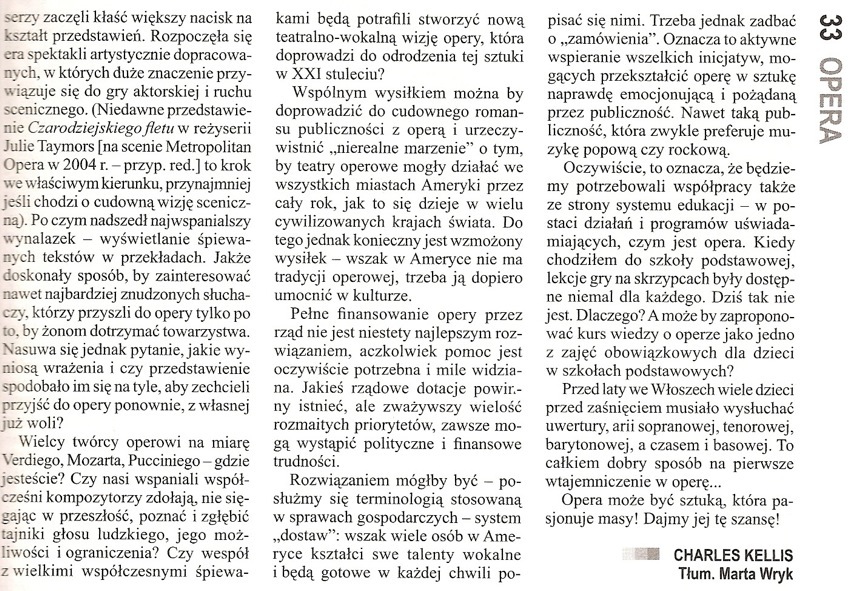CHARLES KELLIS


TWOJA MUZA (February/March) 2014/English


An opening night to remember.
by Charles Kellis
Two of opera's most famous Polish singers opened the 130th season at the Metropolitan opera in the Premiere performance of Eugene Onegin. This marks a first, such an unusual occurrence for opening night. A tribute to Poland that might even be compared to two gold medals for the same event at the Olympics.
This Tchaikovsky Opera generated huge publicity. There were threats of ominous, politically motivated demonstrations which actually materialized at the ---free to the public--- large screen projections in front of the Met Opera House and at Times Square. And then there was the unanticipated surgery of the stage director, Deborah Warner, being replaced by her longtime collaborator, Fiona Shaw who already had commitments to direct opera in Glyndeborne and was unable to attend all rehearsals ---also adding a little unanticipated anxiety.
When the time finally came for the opening night traditional singing of the national anthem, I never heard it sung so well by an American audience. Then it dawned on me that this was a crowd made up of many unsuccessful opera singers who jumped at their big chance to actually sing at the Met, which of course, had to include some heroically interpolated extra high notes.
Then a rousing chant began from different parts of the opera house, ---trying to promote a planned political and social agenda--- demonstrations denouncing both Russian President Vladimir Putin and also the Met Opera. The management had already declared that opera would adhere to music and art alone and not get involved in politics or any other causes. Without being able to successfully recruit the audience into their rally, the protesters were finally escorted out and the show began.
Synopsis: Girl reads books about love and romance; meets boy's indifference and rejection; boy duels, killing his best friend; girl matures, marrying an older wealthy man; Boy returns to desire girl but is also finally rejected.
When a star soprano confronted Tchaikowski with the idea of composing an opera based on Pushkin's "Eugene Onegin", he first considered the plot as being "weak and without enough substance". One morning, however, he woke up full of enthusiasm and started almost non-stop on this project which may well have become his best operatic effort. The wonderful, lyrical lines in Tatiana's letter scene, the impassioned duet with Onegin, Gremin's famous monologue and Onegin's "Kogda bi shizn" together with Lenski's dramatically expressive, "Kuda, Kuda" ---(which still remains one of the most widely performed arias in the entire tenor repertoire) -- all seem to reflect the culmination of Russian operatic romanticism of the late 19th century. Having also been the co-librettist together with the writer Konstantin Schilovsky, Tchaikovsky's masterful thrust of both musical and theatrical understanding introduces Eugene Onegin to be one of the outstanding gems in Russian operatic history.
Right from the outset, this "Onegin" was destined to be a great performance. With the incomparable Anna Netrebko, the highest reigning diva of the opera world today, singing Tatiana in her own native language supported by opera's most famous Russian conductor, Valery Gergiev within an indigenously Russian Opera, had to already be considered an unequivocal "Win, win situation". And as a value added attraction, this festive Metropolitan opera premiere, also featured the two highly regarded and increasingly popular Polish stars. The charismatic baritone Mariusz Kwiecien and the outstanding tenor, Piotr Beczala. Both currently making operatic history with their own high profile performances all around the world,
Tchaikowski's vision of Pushkin's initial interaction between Kwiecien as Onegin and Netrebko as Tatiana was remarkable in capturing the essence of youthful feminine fancy of loving attraction interwoven with the carefree abandon of a somewhat bored young man still wanting to experience the excitement and freedom of his youthful masculine explorations. No appetite for settling down with only one woman.
Anna Netrebko excels as a formidable actress in mischievous, energetically engendered roles. Since her always dependable voice is now more fully grown, Tatiana has brought her back to her roots in this indigenously home grown opera. In her first act letter scene aria, after a slightly shaky beginning, she expertly managed-- to convey innocence and vulnerability in her first enchanting encounter with Onegin. Later as a mature more confident woman ---despite her lingering attraction for Onegin--- Netrebko emotionally dealt with the dichotomy of passion and stability, overcoming the fantasy of youthful love for a man who was egotistically self absorbed. There may also still have existed a feeling of unconscious revenge for having been thwarted in her Initial very painful, emotionally charged rejection. Warner's introduction of a more amorous sexually motivated interaction, seemed to be oddly wanting to try to imply that there might have actually been a consummation of more than just a simple passionate embrace before the final farewell.
Mariusz Kwiecien, his voice now matured into a wonderfully.resonant baritone, showed an amazing ability to capture the true essence of this rather complicated character. He masterfully portrayed a suave, confident, somewhat conceited Onegin, with a carefree arrogance at first, morphing later into the passionate lover about to lose the big prize.
Kwiecien handled that transition masterfully, even prostrating himself at the feet of Tatiana with pleading, almost begging. At first we see Kwiecien casually flirting and carelessly arousing romantic feelings of passion in Tatiana. Regardless of his giving her brotherly advice, it actually only came after his obvious initial conquest. Later when Tatiana was pursuing a comfortable life, honored and respected by a loving husband ----knowing full well that running away together would be an untenable idea ---Onegin still persisted in his advances with an instinctively driven need to win, Was Kwiecien, as Onegin, channeling Giovanni in satisfying his own seductive agenda? This time, however, the fire-consuming him became the humiliation of defeat, dismissed and uncharacteristically rejected.
With so many already varied impressions, can we just add another one of those unexplored insights into the character of Onegin?
His dedicated, well organized vocal intensity was truly remarkable and even more beautiful than when I last heard him. Mariusz Kwiecien is destined to achieve the title of "great singing actor". His keen instinctive ability to transform himself into the mind of Onegin was a feat of quality artistic achievement. His every movement, his body language and sensitive attentiveness to detail, together with his commanding voice that he masterfully uses according to what he is actually expressing in the music, puts him in a league of his own. Kwiecien may well even be more refined than many of history's famous singing actors.
The bass baritone, Alexei Tanovitski, on the other hand offered a proper reading of his character without the proper voice to carry the short role of Gremin. His voice lost both the glory of the high climaxes and totally missed the climactic dignity of a desired, sonorous low F#. The tenor, John Graham-Hall as the Frenchman Triquet, also managed to carry out his mission of praising Tatiana but was nasal and messy---- His voice lacked any kind of real projection that unfortunately relegates him to probably remaining within the realm of comprimario.
Piotr Beczala has developed into becoming one of the world's most sought after tenors. After this premiere of Onegin he will also be opening the season at "la Scala" as Alfredo in "La Traviata". Here he portrayed a thorough understanding of the role of Lenski. His initial beautiful mezza voce, Kuda, Kuda, gradually grew into a full throated expressive, "ya zdu tiebya ziewannyi droog". It is one of the most beautiful arias in the entire tenor repertoire and his performance was among the very best I have ever heard. He is an intelligent singer with a beautiful voice. The most important element in his singing, however, remains what separates the real stars from the ordinary. He has soul. His singing is greatly enhanced by his wonderful ability to allow his obvious sincere and true artistic nature to be projected through both the plaintive sound of his voice, and his extroverted passionate involvement. His uncontrolled jealous rage upon seeing Onegin playing with Olga was dramatically gripping and his later reflection on his life and love was imbued with coherent sentimentality. He is the real thing. No fake pretense. This is a real artist who creates the true essence of art with expressively authentic dedication.
Valery Gergiev was responsible for holding the entire production intact with a steady hand that often had his fingers involved in some unusual dactyl cues to the orchestra. It was his bread and butter Russian traditional, heritage opera full of romantically inspired pathos that he obviously had also conducted many times before to great success. The happy surprise for me was his allowing the singers some unusual freedom with showy elongated final notes. The Met has been rather reluctant, due to time constraints, to allow many grandstanding moments. The show has to start at 8:00 PM and finish exactly on schedule at 10:56. No time for bravura moments. Sometimes it might also be good to go back to the pre-Toscannini, pre-Muti days, allowing for some sensational displays of bel canto exhibition . Usually conductors favor a tidy, well organized completion. Gergiev was more than generous in giving the singers every opportunity to show off their voices with lingering expressive moments in their arias and in this Onegin performance, it really worked.
The stage in the first act was dull, with sets by Tom Pye, that looked like they were simply holdovers from a recent, but newly darkened, Madame Butterfly performance. The second scene merely added a desk giving us a full view of Netrebko's derrière sticking out, sitting dangerously at the desk, writing the famous letter with her back to the audience. The second act gave us a beautiful ballroom. A glimpse into an 18th century scene where the jealously inspired interplay between Lenski and Onegin turned sour to the point of challenging a duel. The dancing was lovely, particularly when Onegin was waltzing with Tatiana. The third act's second scene changed from the book's original drawing room within the castle ---into the countryside. A good tactical move allowing for more imagined speculation. Although the country scene was a welcome change from the original dull, dark atmosphere of the inner drawing room, the huge pillars seemed to be misplaced in the last scene and were annoyingly interfering with the impassioned desperate interaction.
Despite all the unusual pre-performance spectacles and other highly publicized bizarre intrigues, Eugene Onegin, with music at its most appealing romanticism and wonderful cast of singers, created a stellar performance. It's great success honored the propagation of an, "opera for all" movement. Certainly worthy of being acclaimed:
"A Great Night at the Opera".
FINE




